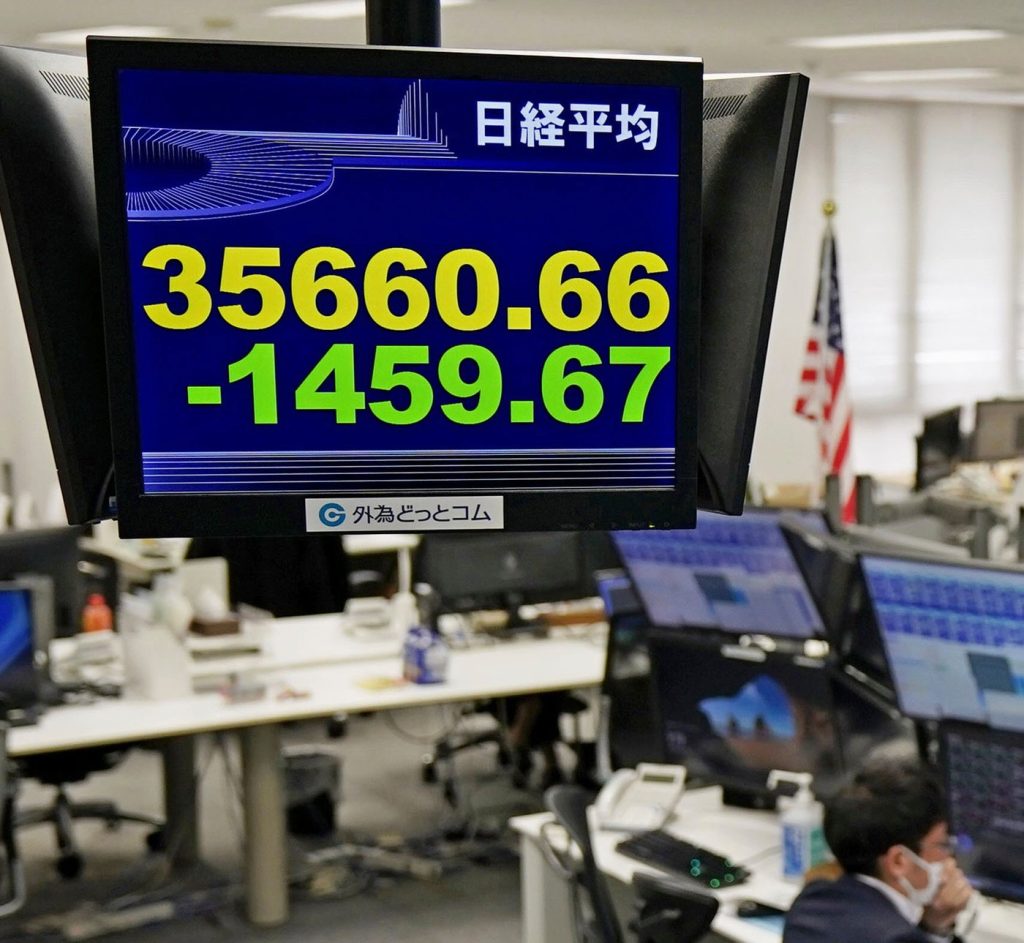HONG KONG (AP) — Asian shares experienced a significant downturn on Monday, driven by a more than 4% decline in Tokyo's Nikkei 225 index, which reflected the impacts of a substantial sell-off on Wall Street. Concerns are mounting about a troubling combination of worsening inflation and a slowing U.S. economy, fueled by consumer hesitancy stemming from ongoing trade war tensions.
U.S. futures and oil prices also faced declines. The Thai SET index fell by 0.9% following a powerful earthquake that struck Myanmar, causing widespread devastation in the country and resulting in minor damage in regions like Bangkok, where a high-rise construction site collapsed.
Tokyo's benchmark index dropped by 4.1% to close at 35,615.15, while Hong Kong's Hang Seng index fell by 1% to 23,200.65. The Shanghai Composite index experienced a decline of 0.5%, closing at 3,333.66. In South Korea, the Kospi index fell by 2.6% to 2,492.49, and Australia's S&P/ASX 200 decreased by 1.6% to 7,856.80. Additionally, Taiwan's Taiex index witnessed a loss of 3.4%.
On the preceding Friday, the S&P 500 index had a dramatic drop of 2%, closing at 5,580.94, marking one of its poorest performance days in the past two years and recording its fifth loss in six weeks. The Dow Jones Industrial Average plummeted by 715 points, a 1.7% decrease, settling at 41,583.90, while the Nasdaq composite fell by 2.7% to reach 17,322.99.
Lululemon Athletica was a major contributor to the market downturn, experiencing a 14.2% decrease despite the company's stronger-than-expected quarterly profits. Similarly, Oxford Industries saw a 5.7% drop even after reporting better-than-expected results.
Concern over President Donald Trump’s escalating tariffs amplified fears on Wall Street that U.S. households and businesses may curb their spending. Even if the tariffs do not have the damaging effects initially predicted, the surrounding uncertainty is expected to alter consumer behaviors, adversely affecting the economy.
A recent report highlighted a growing pessimism among American consumers regarding their financial futures, with two-thirds predicting worsening unemployment in the upcoming year. This sentiment reflects the highest levels of worry since 2009, raising alarms about a job market that is perceived as crucial for the stability of the U.S. economy.
Additionally, an inflation report revealed that a key measure of underlying inflation was slightly worse than economists had anticipated. The Federal Reserve may consider cutting interest rates, similar to their actions late last year, in a bid to support the economy and financial markets. However, such rate cuts could inadvertently worsen inflation, which has persistently exceeded the Fed's 2% target.
While the economy and job market have thus far shown resilience, a simultaneous downturn in these areas alongside high inflation could lead to a worst-case scenario known as "stagflation." Policymakers currently have limited options to address such an economic predicament.
Among the hardest-hit sectors on Wall Street were those reliant on consumer confidence for revenue generation. For instance, Delta Air Lines fell by 5%, casino operator Caesars Entertainment saw a 5% decline, and Domino's Pizza dropped 5.1%. Major losses were also recorded for technology giants, including Apple and Microsoft, whose substantial market caps mean their fluctuations carry more weight in index movements.
Conversely, a few stocks managed to gain during the turmoil, notably utilities estimated to maintain profitability regardless of economic conditions. American Water Works rose by 2.2% amidst the market's overall decline.
Global stock markets are anticipated to remain volatile as the April 2 deadline for new tariffs approaches, an event dubbed "Liberation Day" by Trump, marking the roll-out of tariffs aimed at U.S. trading partners.
In early Monday trading, U.S. benchmark crude oil slid by 40 cents, settling at $68.96 per barrel, while Brent crude oil fell by 36 cents to $72.40 per barrel. The U.S. dollar weakened against the Japanese yen, dropping to 148.86 yen from 149.84 yen, while the euro strengthened, rising to $1.0838 from $1.0803.










